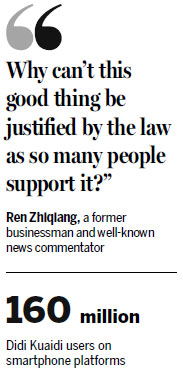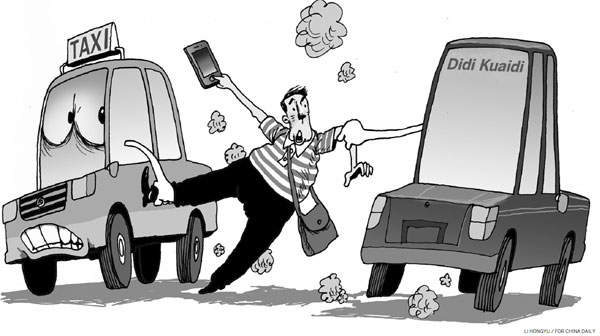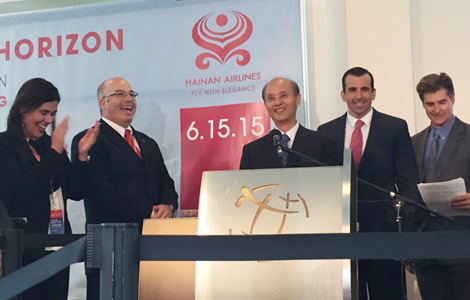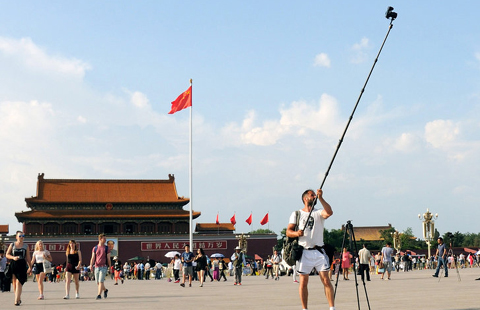Ride-hailing service grows despite opposition
Updated: 2015-06-16 07:43
By Zhao Lei(China Daily)
|
||||||||
Angry taxi drivers say Didi Kuaidi interferes with their 'normal and lawful' operations
Didi Kuaidi, China's dominant ride-hailing company, keeps growing even as it faces challenges on two fronts: profit-pinched taxi companies are threatening a lawsuit and local governments are considering more regulations.
Several taxi firms in Ji'nan, Shandong province, say Didi Kuaidi's ride-hailing services have extensively affected their "normal and lawful" operations, and they plan to file a class-action lawsuit against the smartphone-based transportation services company, Ji'nan Daily reported.
The newspaper said managers from competing taxi firms have consulted with lawyers. Didi Kuaidi declined to respond to the dispute, saying only that it would take necessary measures should a lawsuit be filed, according to the report.
The legal challenge was welcomed by many taxi drivers across the nation as they said Didi Kuaidi's chauffeur and ride-hailing operations have seriously eroded their businesses.
A driver for the Kangle Taxi Co in Chongqing, who asked to be identified only as Zhang, said his daily income had sharply declined.
"Some white-collar office workers used to take my taxi every day, when they came to work or returned home, but now several of them have turned to the car-sharing service by Didi Kuaidi, because those private car owners are their colleagues and charge less than taxis," he said.
"Moreover, some high-income people, especially female office workers, are gradually becoming fond of calling a chauffeur from Didi Kuaidi, who usually drives a nice car," Zhang said. "Taxi drivers, including me, have submitted complaints to our companies, hoping managers could urge the government to do something to help us."
Song Guangcun, a driver at the Beijing Longxiang Taxi Co, said some taxi drivers have quit to work for Didi Kuaidi.
"They told me that working as a chauffeur at Didi Kuaidi will earn them more money than in the taxi company," he said. "If the city government can't take effective measures to curb Didi Kuaidi's development, our business will be strongly hit and no one will be willing to become a taxi driver."
In some major cities, angry taxi drivers have resorted to complaints and strikes. Others have gone further, such as the more than 100 taxi drivers in Zhengzhou, Henan province, who besieged Didi Kuaidi's headquarters on May 27 and smashed at least two private cars signed up with the service.
The Zhengzhou drivers' act might have been inspired by their peers in Tianjin, who gathered hundreds of taxis on May 21 to surround a small group of Didi Kuaidi drivers. A fight broke out and police had to be called to disperse the crowd.
Around the same time, several taxi drivers in Zhejiang province's Hangzhou forced a Didi Kuaidi driver to stop at a transport inspection station, where he was accused of unlicensed commercial operation. Inspectors seized the car.
Government concerns
Didi Kuaidi was created in a February merger between former rivals Didi Dache and Kuaidi Dache and it boasts about 160 million users on its smartphone platforms.
By mid-May, its taxi-hailing service had covered 360 cities and 1.35 million drivers, with daily calls in excess of 4 million, according to the company. Its chauffeur service, meanwhile, covered 61 cities and 400,000 drivers, with up to 1.5 million daily calls.
The latest survey by Analysys International, a provider of information products, indicated that orders from Didi Kuaidi's chauffeur service accounted for 78 percent of the market total in the first quarter of this year.
On June 1, Didi Kuaidi launched yet another service, its Shunfengche car-sharing platform, which enables car owners to share the cars with others. Within the first week into its operation, more than 100,000 transactions were made each day in Beijing.
The company's rapid expansion, plans to dominate the ride-hailing market and opposition from taxi companies have drawn concern and intervention from many city governments.
Since May, senior executives from Didi Kuaidi have been asked to meet with traffic management, transport or public security authorities in a host of cities, including Beijing, Wuhan and Yangzhou. Officials have asked the company to stop using private cars to provide chauffeur and car-hailing services.
Didi Kuaidi is not alone in facing obstacles. Its chief rival, Uber, which ventured into China last July, has been banned in 14 countries and regions. Its Guangzhou branch was raided by local authorities, citing irregular business operations.
As the top transport regulator, the Ministry of Transport has repeatedly said it encourages innovation in the taxi industry, and sees chauffeur services as a way to satisfy diversified demand. However, it has insisted that private cars should not be allowed in for-profit operations because they don't have business licenses and cannot ensure passengers' rights and interests.
The ministry is also soliciting opinions on its newly drafted guidelines to reform the taxi industry. Officials from the ministry convened a closed-door meeting on June 3 attended by transport sector experts, managers of taxi companies and taxi drivers to discuss the reform and issues relating to ride-hailing platforms.
Company supported
Didi Kuaidi, while pledging to cooperate with authorities, has defended its businesses, saying it helps commuters, saves passengers money and helps create jobs.
Liu Qing, president of Didi Kuaidi, said authorities will gradually ease restrictions on ride-hailing providers as their services can play a crucial role in solving city traffic woes.
"Policymakers are aware that the existing traffic and transport regulations have become out of date because they were made at least 10 years ago, when the Internet was not so developed and while commuting in cities was not so painful," she said.
Ren Zhiqiang, a former businessman and well-known news commentator, backed Liu's view in a recent article published on his Sina micro blog.
"The fact that so many people are using these car-hailing apps even though they might know exactly how some of the apps' services have possibly violated current regulations has proved that this is a good thing - thanks to the apps, people now can save time and fuel, and have more options for travel," he wrote.
He added: "Why can't this good thing be justified by the law as so many people support it? (Taxi companies and government departments) should stop using clauses that stand against the public's interests as their excuses."
Xiong Dingzhong, a lawyer at Beijing Bright and Right Law firm, told China Youth Daily that it is difficult for law enforcement departments to define whether Didi Kuaidi's services have violated laws or regulations because the current definitions of taxi service and car rentals are not so clear.
"As long as these regulatory loopholes exist, no government body can make a verdict on these services' legality," he said. "For the company, or other startups in the Internet era, they should consider legal compliance issues when designing a new product or service in order to avoid legal risks."
Zhong Duliang, a researcher at China Center for Urban Development suggested the government update the current transport laws and regulations to legitimize chauffeur and car-sharing services and to regulate the burgeoning industry.
zhaolei@chinadaily.com.cn

|
A driver in Nanchang, Jiangxi province, uses his own car for a private ride-sharing service. Customers contact him by using an app. Provided to China Daily |

(China Daily 06/16/2015 page5)

 Hainan San Jose to Beijing: Ready for take-off
Hainan San Jose to Beijing: Ready for take-off
 Trending Across China: A Porsche gilded in gold
Trending Across China: A Porsche gilded in gold
 Paris Air Show: From Bombardier's new C Series to China Airlines
Paris Air Show: From Bombardier's new C Series to China Airlines
 Warriors move within one win of NBA title
Warriors move within one win of NBA title
 Ten photos you don't wanna miss - weekend special
Ten photos you don't wanna miss - weekend special
 Shanghai's leaning pagoda beats the Leaning Tower of Pisa
Shanghai's leaning pagoda beats the Leaning Tower of Pisa
 Top 10 luxury houses in the world
Top 10 luxury houses in the world
 18th Shanghai Int'l Film Festival kicks off
18th Shanghai Int'l Film Festival kicks off
Most Viewed
Editor's Picks

|

|

|

|

|

|
Today's Top News
China, US to kick off key talks next week
China, US sign agreement to boost army cooperation
City honors slain NYPD
Detective Liu
Chinese students on trial in alleged torture of peer
Alibaba to launch Netflix-like video streaming service
Spacecraft that landed on comet finally wakes up
Former Chinese top legislator Qiao Shi dies in Beijing at age 91
China has adequate fiscal space to absorb local govt debt risks
US Weekly

|

|








